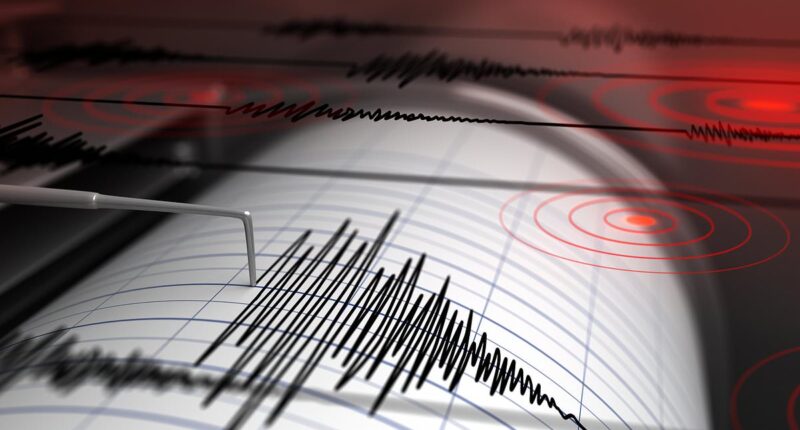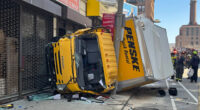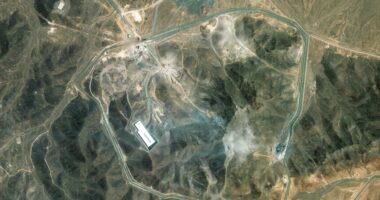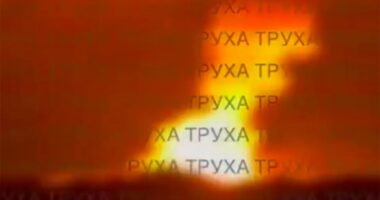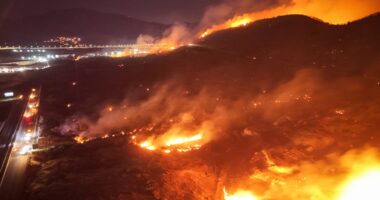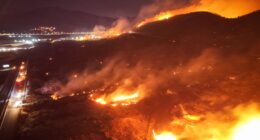An earthquake was detected just miles away from a massive volcano in Alaska that scientists have warned could erupt in the next few weeks.
The US Geological Survey (USGS) detected a 3.7 magnitude quake at 11:44am ET near Petersville, which sits about 30 miles northwest of Mount Spurr.
Mount Spurr, a massive volcanic peak standing at 11,000 feet tall, is displaying warning signs such as heightened seismic activity and ground surface movement, indicating a potential eruption that experts predict could occur in the coming weeks or months.
The US Geological Survey (USGS) has observed a surge in the number of smaller earthquakes occurring within a 30-mile radius of the volcano over the recent days. Mount Spurr is situated approximately 80 miles away from Anchorage, Alaska’s most populous city with nearly 300,000 residents.
The uptick in seismic events around Mount Spurr began in April 2024, and the frequency of these occurrences has amplified significantly. What started with an average of 30 tremors per week has now escalated to around 125 each week as of early October, raising concerns among scientists monitoring the situation.
Tuesday’s earthquake hit 65 miles below the surface, which would typically be related to tectonic plate movement.
But since Mount Spurr is showing signs of unrest, the quake may be linked to magma rising from deeper in the mantle.
Scientists at the Alaska Volcano Observatory (AVO) have warned that Mount Spurr is ‘moving closer to an eruption’ that could happen in ‘weeks to months.’

An earthquake was detected just miles away from a massive volcano in Alaska that scientists have warned could erupt in the next few weeks
The USGS received only two reports of shaking felt in the region, but that was likely due to it being sparsely populated.
The 3.7 magnitude quake struck seven hours after a 2. 5 magnitude quake hit in the same area. These were preceded by a 3.0 magnitude detected on Monday at 6:56pm a few miles away.
But the USGS only reflects 2.5 magnitude or higher quakes on the main dashboard.
On March 7, the volcano began releasing elevated levels of gas from its summit and a side vent that last erupted more than 30 years ago.
The emissions combined with the increased seismic activity and ground deformation has put science on red alert.
Anchorage officials raised the emergency planning level to Level 2 last week, which means that they will ramp up communication with the public about the threat and public safety agencies will prepare to launch into eruption response protocols.
The eruption would most likely occur at the Crater Peak side vent, and ‘it would be explosive,’ Matt Haney, scientist-in-charge at the Alaska Volcano Observatory (AVO) at US Geological Survey (USGS) told DailyMail.com.
This event would spew multiple plumes of ash rising as high as 50,000 feet into the air, Haney said.

The last time Mount Spurr erupted was in 1992 (pictured), which scientists said would likely mirror what is expected to occur in the near future

Tuesday’s earthquake hit 65 miles below the surface, which would typically be related to tectonic plate movement. But since Mount Spurr is showing signs of unrest, the quake may be linked to magma rising from deeper in the mantle
Each ash-producing explosive episode would last three to four hours, and the resulting cloud could blanket the city of Anchorage and other nearby communities in a thick layer of dust.
The eruption would also produce destructive mudslides and avalanches volcanic debris racing down the volcano’s side at over 200 miles per hour, ‘but fortunately, there are not any communities in that radius that would be affected,’ Haney said.
The USGS has the volcano under ‘advisory,’ meaning it ‘is exhibiting signs of elevated unrest.’
The last time Mount Spurr erupted was in 1992, and scientists said the imminent explosion would likely mirror that.
More than 30 years ago, the volcano covered the entire city of Anchorage in an eighth of an inch of ash.
The skies darkened in the middle of the day due to the enormous cloud of dust and gas, and the city’s airport was forced to shut down for 20 hours.
Crater Peak then erupted two more times, once in August and again in September.
The Municipality of Anchorage reported nearly $2 million in damages, office closures and cleanup costs from the August eruption, according to the National Oceanic and Atmospheric Administration (NOAA).
No one was killed by these events directly. But two heart attacks, one fatal, from shoveling ashfall were reported in Anchorage.
Breathing in ash also poses a health hazards. The tiny particles can work their way deep into the lungs, worsening symptoms for people with respiratory conditions such as asthma or bronchitis.
Ff Mount Spurr’s activity continues to ramp up, the next sign of an eruption will be a volcanic tremor, Haney warned.
